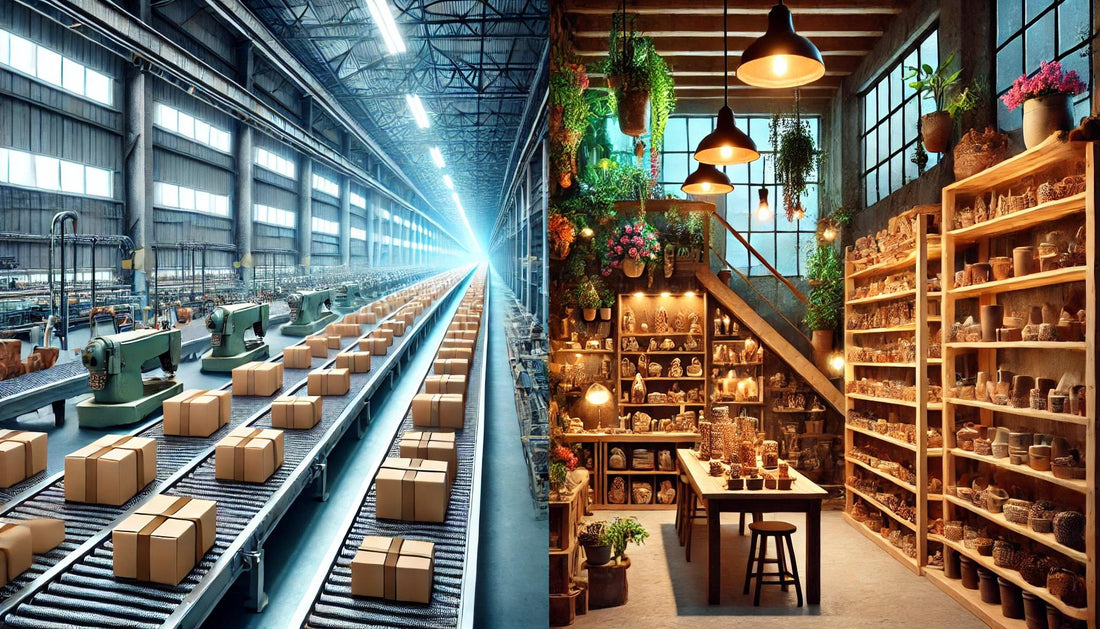
How Did We Get So Used to Warehouse-Manufactured Products?
In a world of convenience and mass production, many of us have grown accustomed to products churned out by the thousands, stacked on shelves, and neatly shrink-wrapped for easy consumption. But have we ever stopped to ask ourselves: how did we get here? And what might we be missing by relying on these warehouse-manufactured goods?
A Shift Toward Speed and Uniformity
The industrial revolution transformed how we create and consume. Handmade craftsmanship, which once served as the backbone of community economies, began to fade as mass production took center stage. Products became cheaper, more consistent, and readily available. Over time, society equated uniformity with quality and speed with progress.
We started trading tradition for trend, losing sight of the intention behind the goods we used daily. When the focus shifted to profits and scalability, the soul of production—the connection to the creator and the land—was left behind.
Why Reclaim Handmade and Small Batch?

Today, there’s a growing desire to return to what feels real, tangible, and intentional. Here’s why embracing handmade and small-batch products can enrich your life:
1. Thoughtful Creation
Handmade products, especially those crafted in small batches, come with a story. They’re infused with care, skill, and a deep understanding of their purpose. When you hold a product made by a human hand rather than a machine, it carries a sense of reverence and connection.
2. Potent Healing Botanicals
Unlike mass-produced goods laden with fillers and synthetic chemicals, small-batch products often highlight pure, potent ingredients—many of which are derived from nature’s apothecary. Botanicals like lavender, calendula, and vetiver are not only fragrant but also imbued with centuries of healing wisdom.
3. Environmental Stewardship
Handmade goods are frequently produced with sustainability in mind, using minimal packaging and eco-friendly processes. Supporting these products helps reduce the massive waste and environmental toll of large-scale manufacturing.
4. Unique and Personal
No two handmade items are exactly alike. Each creation is a reflection of the maker’s craft and passion. It feels personal, like it was made just for you.
5. Reconnecting with the Past
Small-batch production reminds us of a time when quality mattered more than quantity, and relationships were forged over shared creations. It’s a gentle nudge to slow down and appreciate the beauty in the everyday.
How to Transition Back to Handmade
Making the shift doesn’t mean abandoning convenience altogether. Start small:
• Support Local Artisans: Visit farmers’ markets or small businesses to find handcrafted goods.
• Read Labels: Opt for products with natural ingredients and transparent sourcing.
• Invest in Quality: Small-batch items may cost more, but their longevity and efficacy make them worth every penny.
The Call to Return
The rise of warehouse-manufactured goods might have streamlined our lives, but it also distanced us from our roots and from the natural world. Returning to handmade and small-batch creations isn’t just about nostalgia—it’s about reclaiming quality, intention, and connection.
When you choose a handmade product infused with potent botanicals, you’re not just buying a thing—you’re embracing a way of life that honors the earth, the maker, and yourself.
So, what will you choose the next time you reach for a product: convenience or connection?
AI generated photo transparency: The images featured in this post are AI-generated, crafted to evoke the unique story and atmosphere of Moonroot Apothecary. Each image is designed to visually express the essence of the products, themes, and feelings shared here.